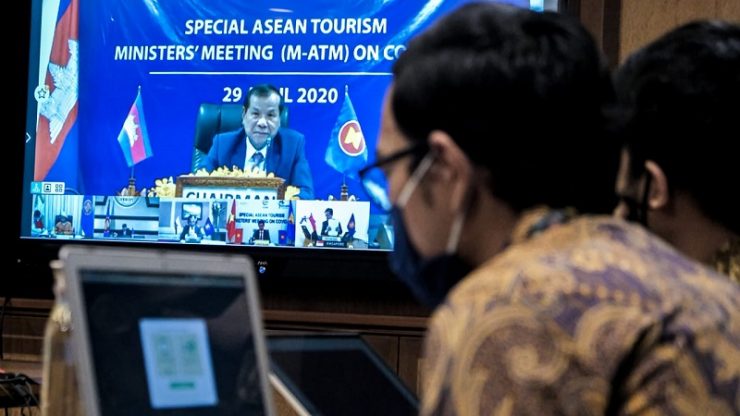THE Ministry of Tourism & Creative Economy reaffirmed Indonesia’s support in the development of digital tourism and included it in the 2016-2025 ASEAN Tourism Strategic Plan.
According to Deputy Minister of Tourism and Creative Economy/Deputy Head of Tourism and Creative Economy Agency, Angela Tanoesoedibjo when speaking at the Special Meeting of the ASEAN Tourism Ministers (M-ATM) on COVID-19, Wednesday (29/4), said the meeting was attended by tourism ministers from ASEAN countries are very important as a form of shared concern for tourism which is the most affected sector of the COVID-19 outbreak. Not only can it survive this difficult time, but it can also recover soon after the pandemic ends.
“I want to reiterate Indonesia’s commitment to support programs and activities, in the context of the ASEAN Tourism Strategic Plan and more, especially in these difficult times to encourage activities that can accelerate the recovery of tourism in ASEAN,” Angela said.
M-ATM COVID-19 is led by Cambodia as Chair and Indonesia as Vice-Chair. ASEAN member countries participating in this agenda are Brunei Darussalam, Laos, Malaysia, Myanmar, the Philippines, Singapore, Thailand and Vietnam. This meeting was Minister Wishnutama Kusubandio’s idea to discuss the impact of COVID-19 on tourism in ASEAN, as well as to find solutions to work together to mitigate it.
Angela explained, since the COVID-19 case was first confirmed in Indonesia in early March 2020, the Indonesian government has been preparing for an undeniable impact. The Indonesian government is working hard to overcome the impact of this pandemic under an economic stimulus policy with a budget of more than US$24 billion for social security nets, tax breaks, assistance for affected workers, and so on.
“Specifically in the tourism sector and the creative economy, President Joko Widodo has instructed three main steps. Namely social protection programs for workers, economic stimulus for business in this sector, and the reallocation of the ministry’s budget into various programs, including labor-intensive,” Angela noted.
To implement the instruction, Angela continued that the Indonesian Ministry of Tourism & Creative Economy has formulated various programs and activities to support more than 13 million direct workers and 32.5 million indirect workers in the Indonesian tourism sector.
The programs and activities include distributing daily necessities and hygiene and sanitation equipment, as well as training and skills upgrading for affected tourism workers, and applying protocol standards for health, hygiene and safety in the destination.
“We are also working with the private sector to support thousands of health workers as the frontline in dealing with COVID-19 by providing accommodation, shuttle services (transportation), food and beverages, and laundry,” Angela affirmed.
This cooperation is also a form of the Ministry of Tourism’s support for the tourism industry, namely the hotel and transportation business so that they can continue to employ their employees.
On the other hand, Angela said, now we see how technology and digital media provide a new way of routine and life that will become “New Normal”. For this reason, I reiterated Indonesia’s support for incorporating digital tourism into the 2016-2025 ASEAN Tourism Strategic Plan.
“This pandemic will bring us to the” New Normal “condition. In addition to encouraging the importance of health and hygiene standards for tourism professionals, through this virtual meeting, we are shown how technology and digital media lead us to new routines and ways of life. This is what we will soon experience in the tourism industry. We must respond to this shared challenge by working together. Together we will be strong,” Angela concluded.
The Special Meeting of the ASEAN Tourism Ministers (M-ATM) on Coronavirus Disease 2019 (COVID-19) then produced two important things, namely the Consolidated Paper and the Joint Statement. Consolidated Paper is used as a reference regarding the assessment and initial steps to reduce the impact of COVID-19 on ASEAN member countries.
Whereas the Joint Statement contains commitments of countries, proposals for the establishment of the ASEAN Tourism Crisis Communication Team, and exploration of joint policies to be discussed by the Heads of National Tourism Organizations (NTOs) and Committees. [traveltext.id]
















